Transforming your journal into an intelligent companion – with Almus
Struggling to start or maintain a journaling habit? Discover Almus, a simple, AI-powered journaling app that helps you capture thoughts, uncover hidden patterns, and reflect with ease. No complex systems, just meaningful insights from your own words.
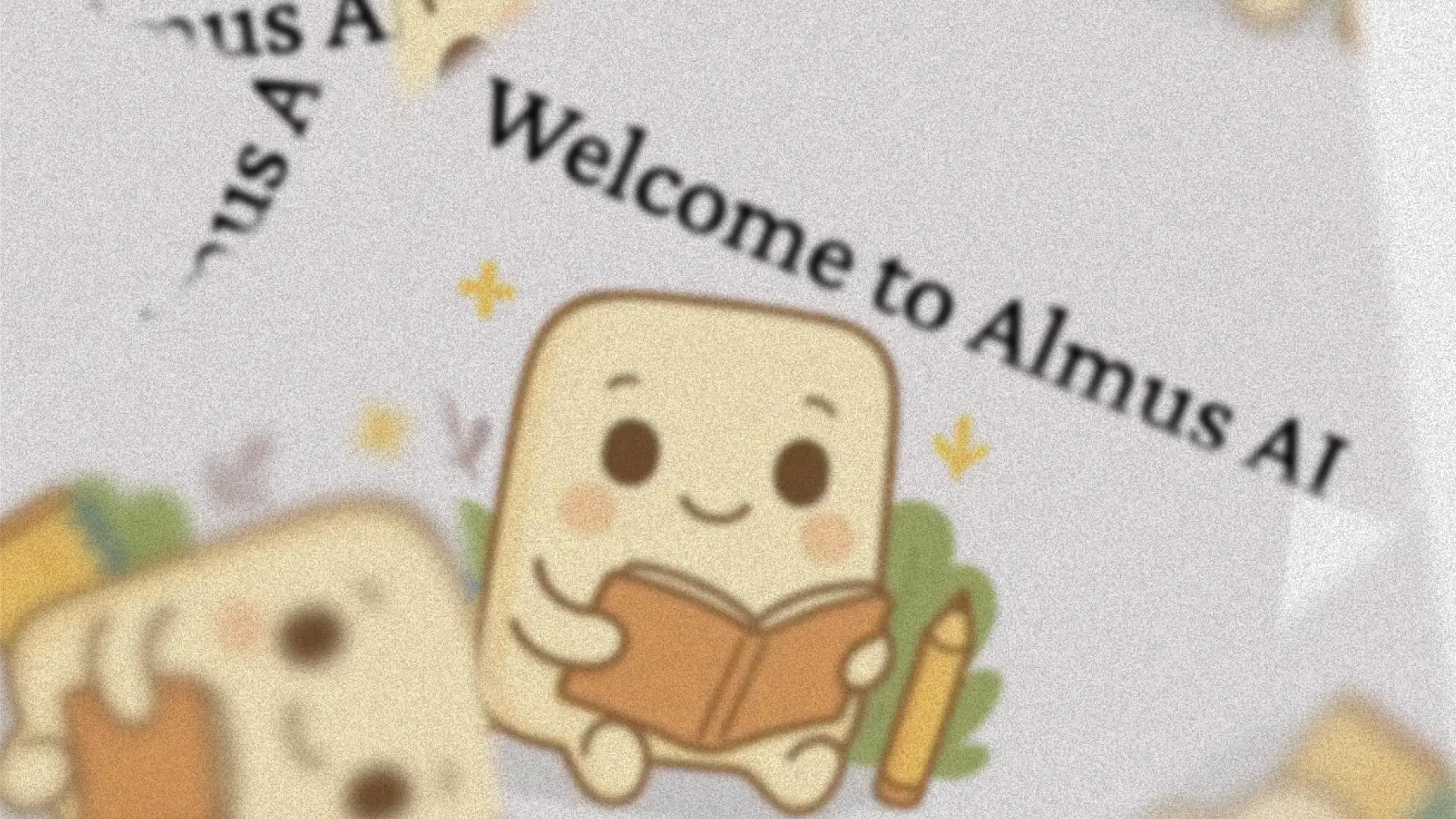
Throughout the past years, I have wrote multiple posts and bits about the topic of journaling. And with this post, I am continuing that, since one of the main goals with Creativerly and my writing in general is to share my experiences in the hope to create and share value for others. Creating and maintaining a daily jorunaling habit can be challenging for multiple reasons. There are obstacles that can be overwhelming, especially when you are starting out with your journaling journey.
Among those obstacles you find 'Lack of time' as people feel they have busy schedules and struggle to find time for journaling, 'Unclear purpose' as without a clear understanding of why you are journaling (although, even journaling without a purpose is pure fun) it might be hard to stay motivated, 'Lack of immediate results' as the benefits of journaling often accumulate over time and may not be immediately apparent, so it can be hard for people to stay on track, or 'Negative self-judgement' as people might be hesitant to confront their thoughts and feelings. And besides all of that, there is the burden of working yourself through hundreds of apps which promise you to change your life.
Just using a pen and a paper notebook might already be enough to get started for most people. However, as a lot of my work happens digitally, on multiple devices, and I need to ensure to have access to my notes, thoughts, and ideas from all of them, working with digital journaling apps provides important factors like convenience of input, and accessing it anywhere, anytime. They let me easily search through my notes, I can add photos, videos, and links, back up my data, profit from new achievements in the field of technology and how they get implemented in the realm of note-taking apps (although, I do not endorse everything), and more.
Now, when you are looking for an app to meet your journaling needs, do not let you get blinded by productivity-gurus preaching about different note-taking and knowledge management systems that will change your life (you do not need those, in fact, complex productivity and knowledge management systems are simply procrastination).
When you get started with journaling, factoring in the above mentioned obstacles, the goal is to have an app that supports you while tackling those, and makes it as easy as possible to get started and making sense of whatever you are writing down. In case your goal with journaling is to capture all your ideas and find them easily at a later stage, discover patterns to improve your well-being, tackle challenges you face over and over again, and do not want to spend hours searching for that one important thought you have captured, then I would like to introduce you to Almus.
What is Almus?
Almus is a journaling app that listens, responds, and helps you discover the insights hidden in your own words. It provides a quick and easy way to get started with journaling, without having to worry about systems, creating links, using tags, whatsoever, it helps you to only focus on the writing part. Besides that, it solves the issue of the 'Unclear purpose' of journaling, since just after a couple of entries, Almus will discover new insights by transforming silent entries to uncover hidden patterns. Obviously, those insights improve as you are spending more time with it, and add more and more journaling entries.
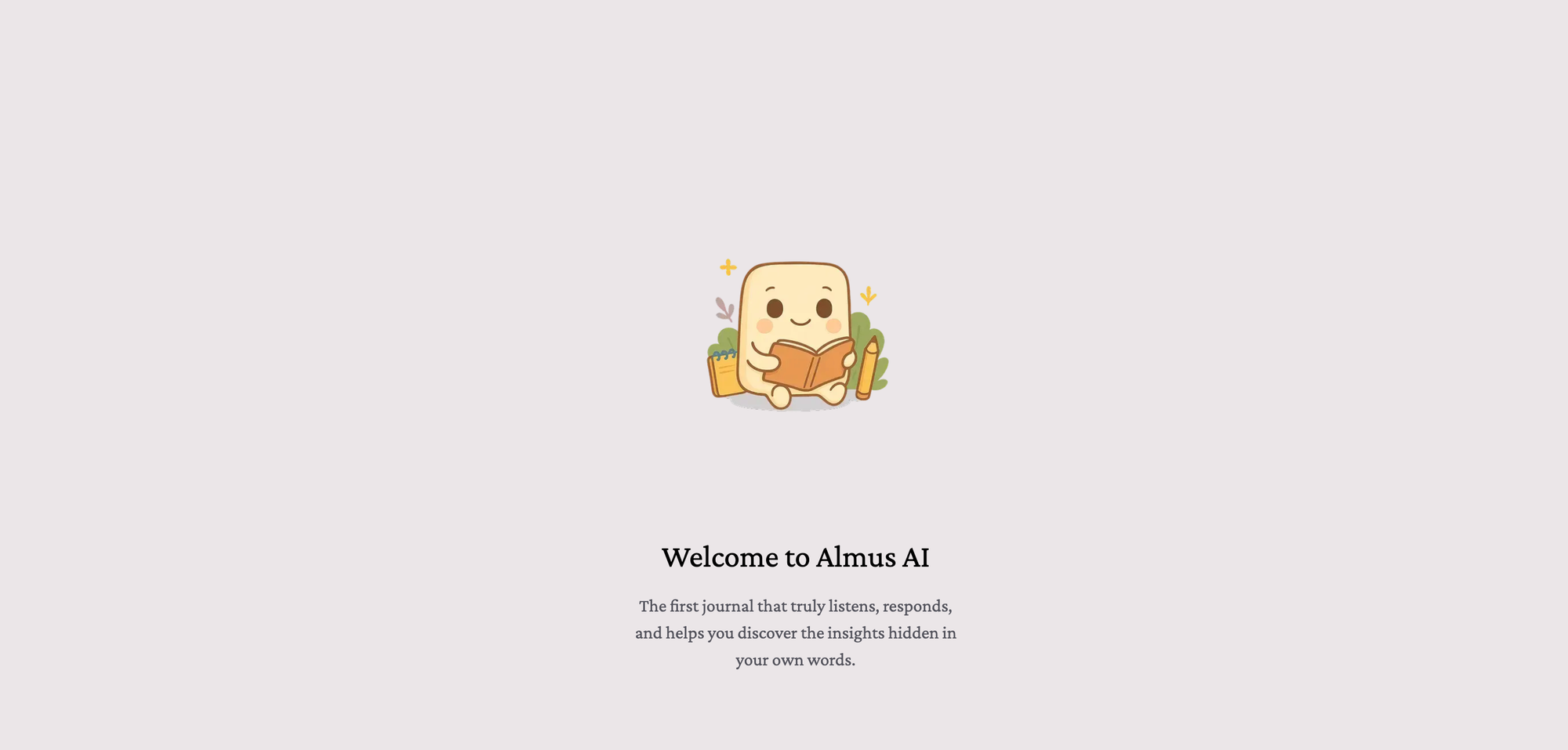
What usually requires a lot of work, manual linking, reviewing, and making sense of the connections you make while journaling, gets automated in Almus. With Almus, you get a simple and beautifully designed companion that helps you capturing and reflecting on moments in your life with ease, while it also provides you with insights and context from those memories.
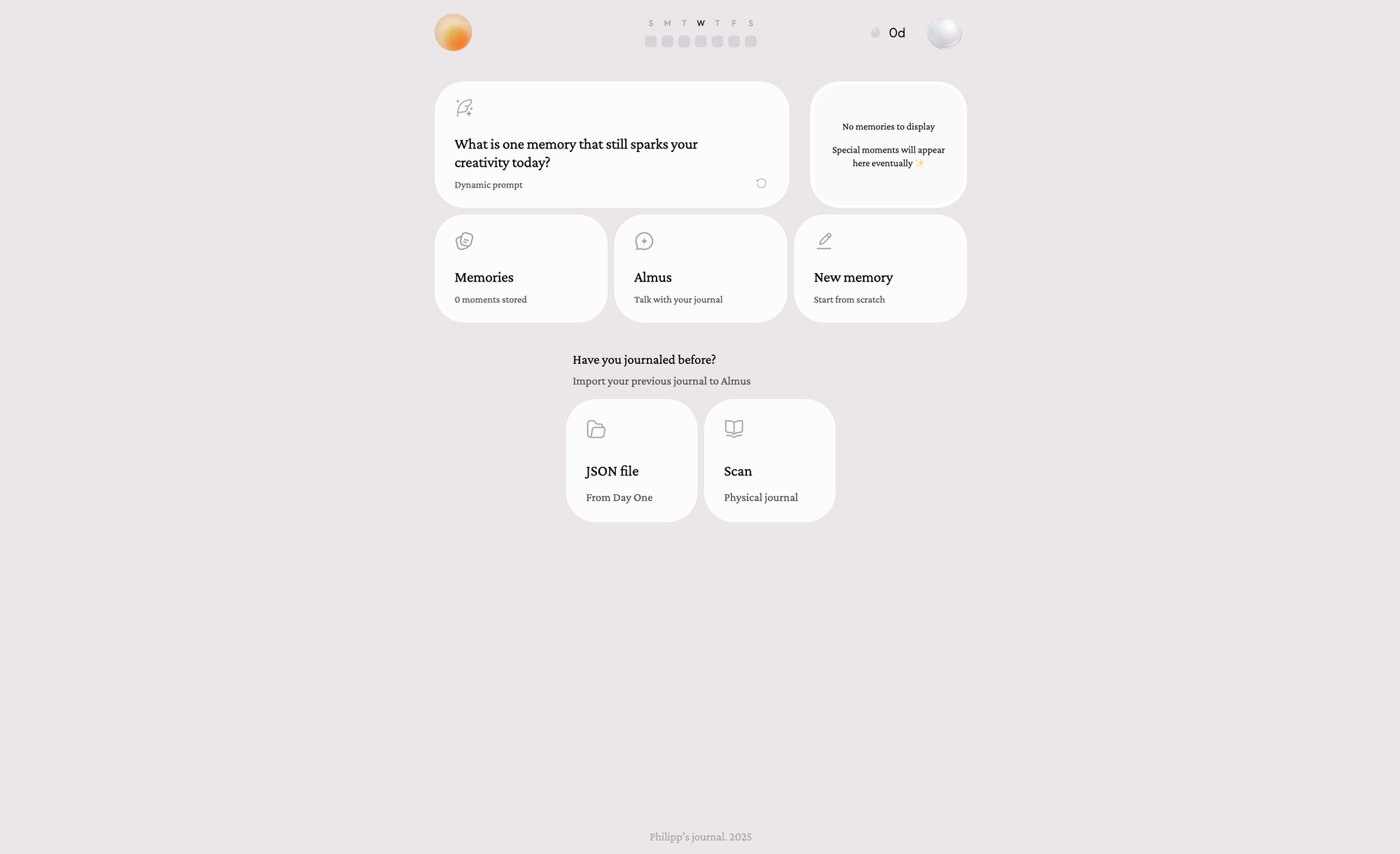
Besides all of that, Almus is committed to privacy and security, as everything gets encrypted before it leaves your phone or computer, and the only thing that get stored in Almus' database is the locked-down, unreadable data.
My experience so far
When it comes to the overall writing experience, Almus is minimal, but also a bit limited, and I assume this is by design. What I mean by limited is that there are no formatting controls, no advanced writing stats (once you finished creating your memory you can see the word count and how much time you spent writing it, but those are only visible after you actually finished creating it), no outline, no headings, etc. and this is by design since rather than doing traditional note-taking, writing, formatting, and creating doc-style notes, Almus is aimed at providing a simple and easy way to get your thoughts out of your head, and into Almus to then analyze, and work with them. If you want to discover patterns, learn, and grow from the memories you jot down, you should not get distracted by formatting everything into detail or checking your writing stats. But keep in mind that if you are someone who wants to have minimum formatting capabilities that, as of writing this, Almus does not support them.
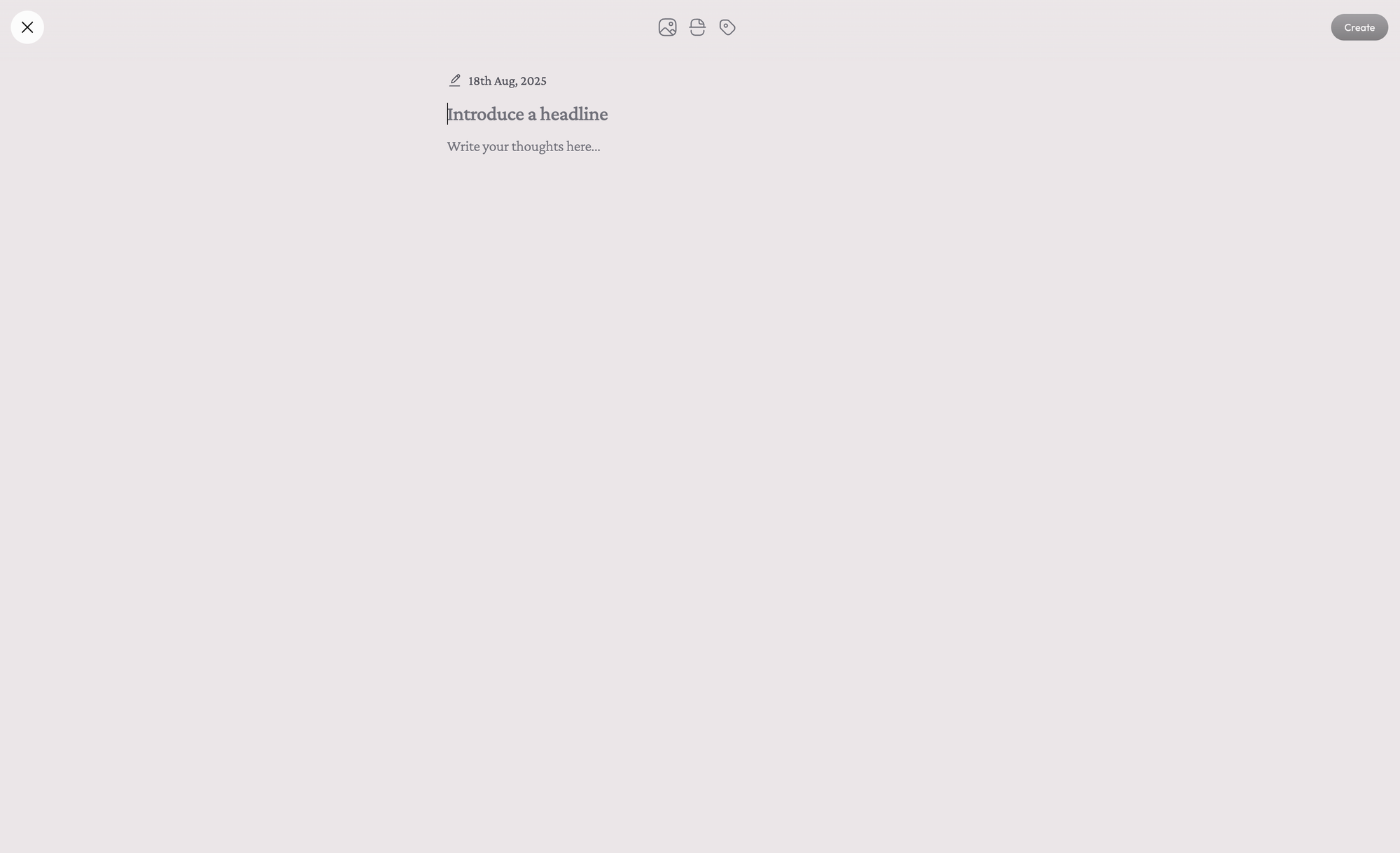
As with journaling in general, you will see the benefits and the value of it as you continue to practice it over time. You start reflecting on your thoughts, events you have been a part of, connections you have made. However, it can be hard to maintain that consistency in order to discover patterns and ideas. With Almus, you need at least four memories captured to get insights from your journaling practice within a whole month, or at least three memories capture to get insights from a week.
Those insights can be helpful especially when you are starting out with your journaling practice. Just being consistent with journaling is already a hard task, but revisiting, reviewing, and reflecting on your notes is even harder. And Almus with its insights tries to take that task off of your hands. Almus' insights provide you with a summary of the memories you have captured, it shows you some highlights in the form of tags or categories, and triggers. It is nice to read through those summaries, but it also felt like just getting reminded of the things I have noted down throughout the past month instead of getting insights from what I have journaled about. There is a chance that this is based on wrong expectations from my side, but I thought that if my memories are getting analyzed in order to provide insights, that the output would be more than a summary of those notes. For example, within the Triggers section it said "Nature Calming Effect" with the note "You find peace and tranquility in nature, with the sounds of birds chirping and greenery bringing you calm and inspiration. This connection to nature has a positive impact on your emotional state". This felt like just a summary in two sentences with some different words compared to what I wrote down.
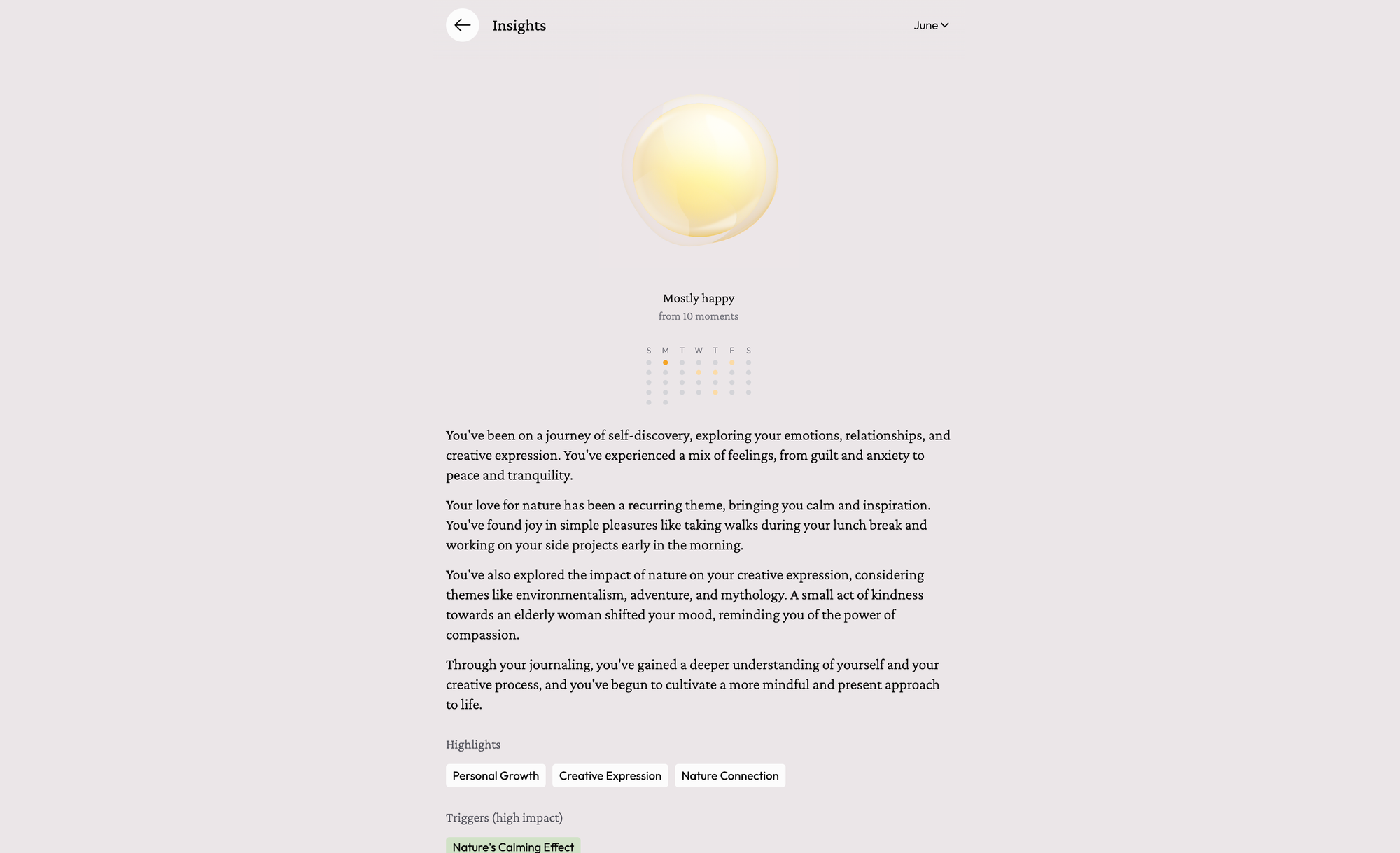
Do not get me wrong, it is still a great feature to have since in traditional note-taking and journaling apps you do not get anything of that, left alone with your notes. So, this is helpful, and to some extent insightful, but I assume the deeper connection and understanding of your notes and memories comes from fueling Almus with an increasing number of memories over time. Ultimately, it is you who then gets to decide on how to take actions based on what your own writing reveals about you. And this is where I am again mentioning traditional note-taking and journaling apps, as they are not revealing something about yourself through your writing by default, it needs manual work to do so. In case you are looking for an app that leverages advanced AI to give you a helping hand, then Almus is worth checking out. And if you want to understand your journaling practices even more, you can chat with your entire journal history directly within Almus.
Journaling is a deeply personal practice, one that evolves with you over time. It is not about perfection, elaborate systems, or chasing immediate results. It is about showing up, reflecting, and making sense of your thoughts, one entry at a time. The obstacles like lack of time, unclear purpose, self-judgment are real, but they do not have to be roadblocks. Sometimes, all you need is a tool that meets you where you are, removes unnecessary friction, and helps you focus on what truly matters: the act of writing and the insights that emerge from it.
Almus does not promise to revolutionize your life with complex systems or overwhelming features. Instead, it offers something simpler, yet powerful: a space to write, reflect, and discover patterns in your own words, without the burden of manual organization or the pressure to “do it right.” It is designed for those who want to journal consistently, but also want a little help along the way, whether that is through thoughtful prompts, automated insights, or the ability to search and revisit memories with ease. While its AI-driven insights may not replace the depth of your own reflection, they serve as a helpful starting point, especially when you’re just beginning or struggling to see the bigger picture.
Of course, no app is perfect. Almus’ minimalist approach means it won’t cater to everyone, particularly those who crave advanced formatting or granular control over their notes. But for anyone looking to build a sustainable journaling habit—without the noise of productivity gurus or the paralysis of choice, Almus provides a refreshing, user-friendly alternative. It encourages you to write first and worry about the rest later, trusting that the value will reveal itself over time.
Ultimately, the best journaling tool is the one you will actually use. If you are drawn to the idea of a digital companion that listens, learns, and helps you uncover the stories hidden in your own writing, Almus is worth exploring. It will not do the work of self-discovery for you, but it will walk beside you, making the process a little easier and a lot more insightful. And in a world where we are constantly bombarded with information, having a quiet corner to pause, reflect, and grow is more valuable than ever.
So, if you have been putting off journaling because it feels too daunting or disjointed, give Almus a try. Start small, stay consistent, and let your own words guide you. After all, the most meaningful insights often come from the simplest beginnings.
The ease of journaling with Almus
For a lot of people, the biggest hurdle of getting started with journaling is that they do not know what they should actually write about or note down. They sit in front of their app, and struggle to find things that are worth noting down. I have been there too. I knew I wanted to start journaling, however, influenced by all those productivity gurus preaching their systems, I felt overwhelmed, and did not know how to actually begin, I was unsure about what to write or how to structure my entries.
Thankfully, getting started with journaling in Almus is easy and streamlined. Whenever you feel like you experiencing a creative block, not knowing what to write about, Almus will provide you with a variety of journaling prompts to capture your thoughts, provoke thinking about specific topics and events, and discover insights you had no idea about. In Almus, those prompts are called Dynamic prompts and they change every day when you log back into the app. In fact, as you are journaling more and more with Almus, it gets to know you and your current situation, struggles, thoughts, and ideas better. This means, those dynamic prompts are adapting to your situation, they are not static classic template journaling prompts, but rather another great way and feature how Almus is transforming your journaling practice.
Among those prompts I found questions like "What small joy are you allowing yourself to enjoy today?", "How can a recent outdoor experience influence your next creative project?", or "What small scene from nature inspires your most vivid imagination?". In case you are struggling with one prompt, you can use the reload icon in the bottom right corner of the prompt card to load a new prompt. You can do that as many times as you want.
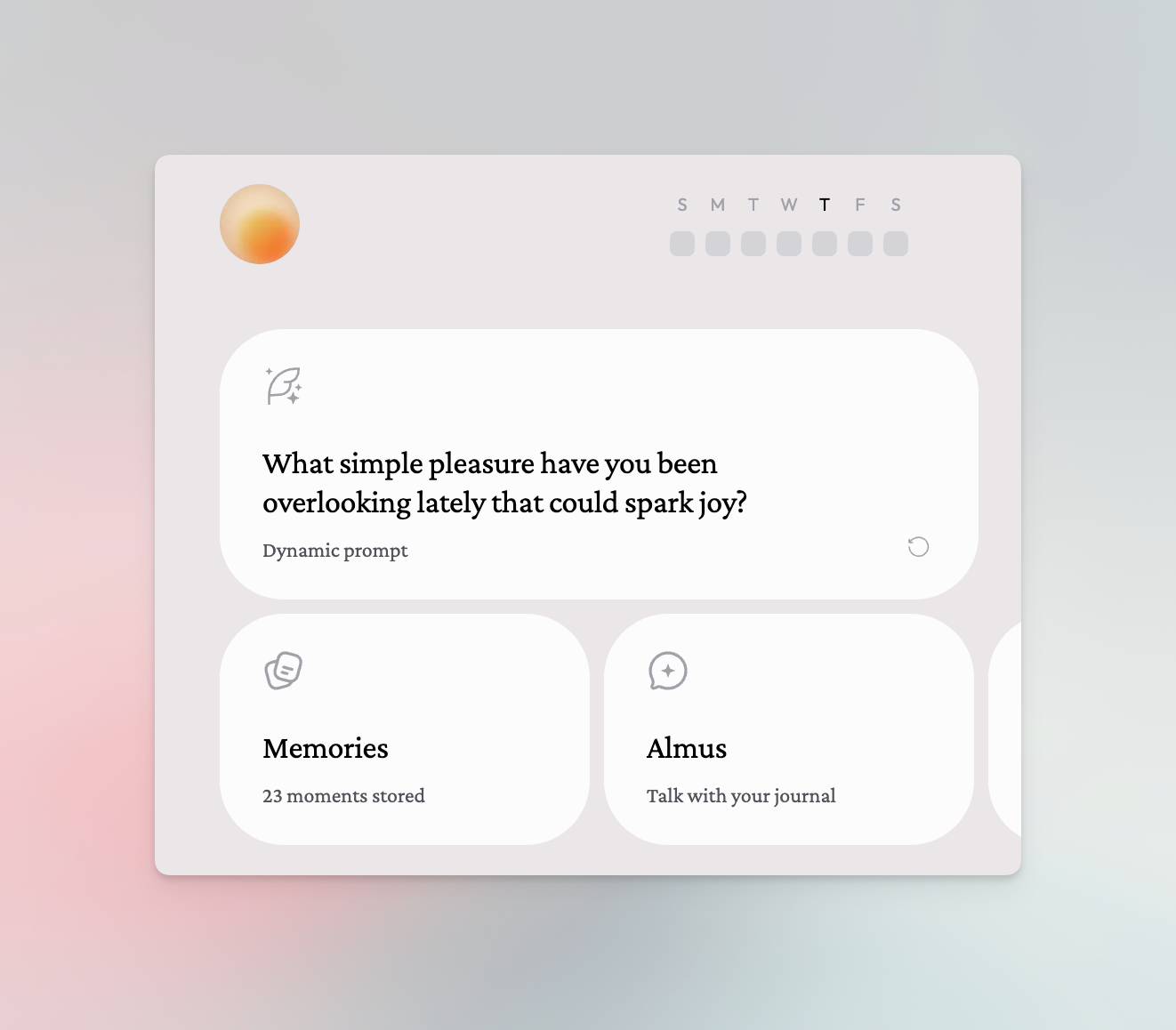
Keeping your notes and memories safe and secure
Now, whenever an app leverages technologies like AI and providers like OpenAI, there are some users who have eligible concerns when it comes to privacy and security of their data, and in context with Almus, of their journal entries and personal notes. Almus states in its privacy policy that all data transmitted between you and their services is secured using strong encryption protocols. This includes the use of Secure Socket Layer (SSL) technology, which ensures that your data remains private and integral. Furthermore, Almus is using Supabase for data storage, and the privacy policy further states that Supabase automatically encrypts all data in transit and at rest, providing an added layer of security for your data. On top of that, the memories which you are collecting with Almus are encrypted on your device before being stored in Almus' database, which means only you as the user can decrypt and read your memories.
When it comes to the AI interaction, your memories are decrypted on your device and sent to OpenAI to generate responses, however, Almus never has access to your decrypted memories. Almus uses OpenAI for artificial intelligence operations and language processing, while all data processed through these services is anonymized, as for Almus AI it contains only the contents of journal entries without any user-identifying information.
Almus is transparent about how they are using and storing your data, as well as how they are creating the interaction with OpenAI in order to provide advanced features, analyzing your memories, discovering patterns, and transforming your notes.
You have to answer yourself whether you are fine with your journal data being processed by OpenAI in order to use those advanced features in Almus.
Journaling does not have to be complicated. Whether you are just beginning or looking for a simpler, more intuitive way to reflect, Almus offers a refreshing approach, focusing on what matters most: your thoughts, your memories and your growth.
If you are curious to see how Almus can help you build a consistent journaling habit, give it a try today. Start with a single entry, explore the prompts and let the insights unfold over time. After all, the best way to discover the value of journaling is to simply begin.

Till next time! 👋
Support: Do you have a friend who is looking for inspiration, news about design, and useful tools and apps? Forward this newsletter to a friend or simply share this issue and show some support. You can also show some love by simply clicking the button down below and keep this newsletter a sustainable side-project by buying me a coffee. ☕️ 🥰





Discussion